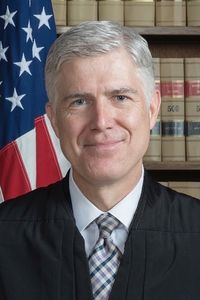Neil McGill Gorsuch, born on August 29, 1967, is an American jurist currently serving as an associate justice of the Supreme Court of the United States.
Gorsuch's early life was spent in Denver, Colorado, before he moved to Bethesda, Maryland, to attend Georgetown Preparatory School. He then matriculated at Columbia University, where he developed a passion for writing, and later received his legal education at Harvard Law School.
After 15 years of practicing law, Gorsuch obtained a Doctor of Philosophy in jurisprudence from the University of Oxford on a Marshall Scholarship, focusing his doctoral thesis on the morality of assisted suicide under the supervision of renowned legal philosopher John Finnis.
Gorsuch spent 10 years in private practice with the law firm of Kellogg, Hansen, Todd, Figel & Frederick before becoming the principal deputy associate attorney general at the United States Department of Justice from 2005 to 2006.
President George W. Bush nominated Gorsuch to the United States Court of Appeals for the Tenth Circuit in 2006, replacing Judge David M. Ebel. He is known for his adherence to textualism in statutory interpretation and originalism in interpreting the United States Constitution, and has also been an advocate for natural law jurisprudence, alongside Justice Clarence Thomas.
Gorsuch has a rich history of clerking for notable judges and justices, including Judge David B. Sentelle of the U.S. Court of Appeals for the D.C. Circuit, and U.S. Supreme Court justices Byron White and Anthony Kennedy. He is the first Supreme Court justice to serve alongside a justice for whom he once clerked, Kennedy.
Throughout his tenure on the Supreme Court, Gorsuch has written the majority opinion in several landmark cases, including Bostock v. Clayton County on LGBT rights, McGirt v. Oklahoma on Native American law, Kennedy v. Bremerton School District on personal religious observance, 303 Creative LLC v. Elenis on free speech, and Ramos v. Louisiana on juries' guilty verdicts.
















